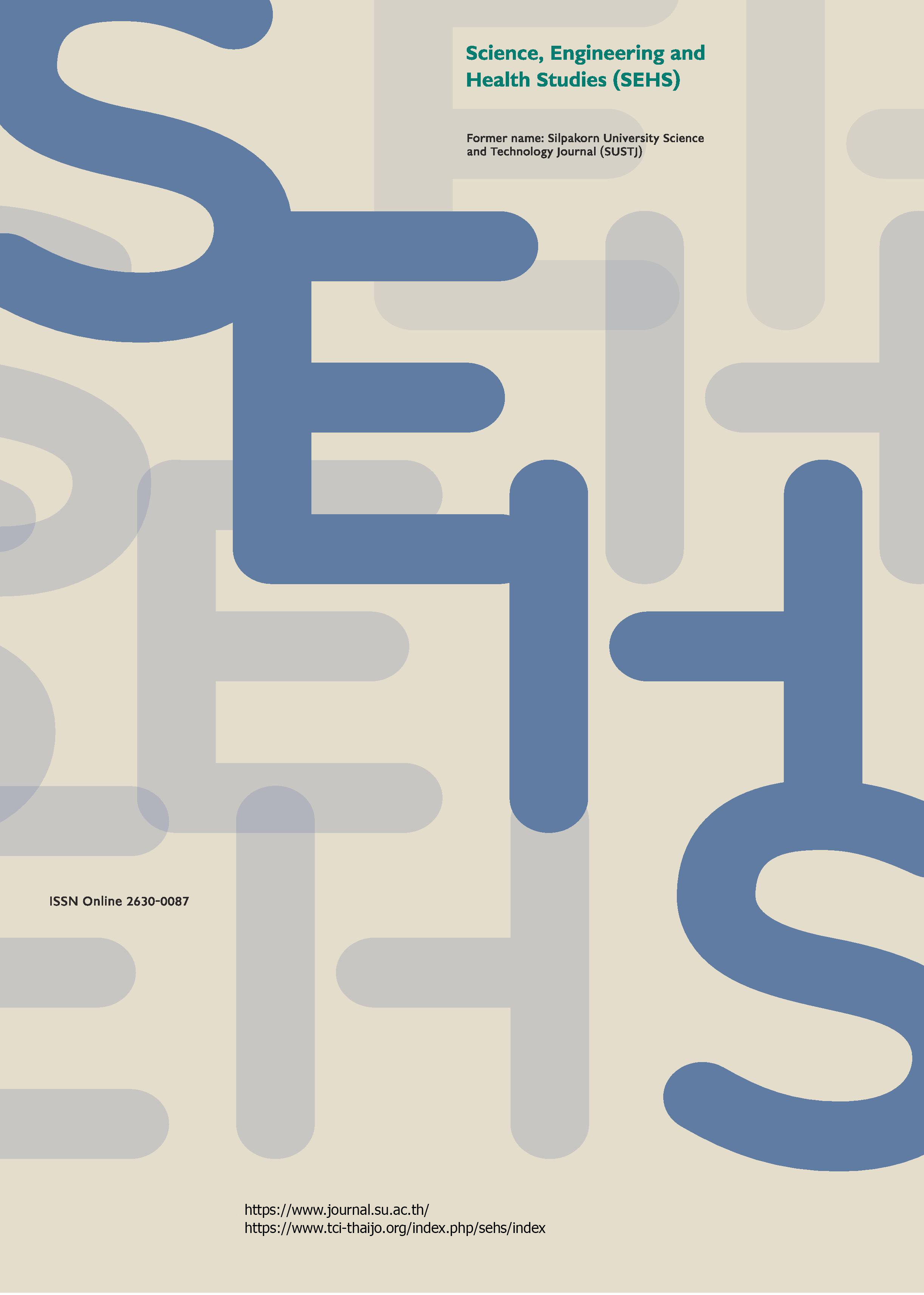Toward traceability model between ISO/IEC 29110 artefacts and agile process
Main Article Content
Abstract
This paper presents the efficacy of the traceability model in the development of artefacts related to pre-defined activities in the ISO/IEC 29110 process and ones related to agile process. This efficacy is demonstrated through a study of very small entities (VSEs) in Thailand who applied a development script based on the traceability model for various software projects. Six VSEs, with their respective software development projects, participated in the study with comparable time constraints and budgets. The VSE development teams utilized the traceability model to establish connections between the artifacts of the agile process and the ISO/IEC 29110 standard. The results show the potential benefits for VSEs in the application of the traceability model in such processes and what the teams learned from their participation. Each team’s productivity differed only slightly. The average figure of productivity with the traceability model was 1.416. However, the average figure of productivity without the traceability model was 1.3045. It is found the agile process can be facilitated and less effort by applying the traceability model.
Downloads
Article Details

This work is licensed under a Creative Commons Attribution-NonCommercial-NoDerivatives 4.0 International License.
References
Alvarez, J. J., and Hurtado, J. A. (2014). Implementing the software requirements engineering practices of the ISO 29110-5-1-1 standard with the unified process. In Proceeding of the 2014 9th Computing Colombian Conference (9CCC), pp. 175–183. Pereira, Colombia.
Anderson, D. J. (2010). Kanban: Successful Evolutionary Change for Your Technology Business, Washington DC: Blue Hole Press.
Barry, E. J., Mukhopadhyay, T., and Slaughter, S. A. (2002). Software project duration and effort: An empirical study. Information Technology and Management, 3(1), 113–136.
Boucher, Q., Perrouin, G., Deprez, J.-C, and Heymans, P. (2012). Towards configurable ISO/IEC 29110-compliant software development processes for very small entities. In Systems, Software and Services Process Improvement: Communications in Computer and Information Science, Vol. 301 (Winkler, D., O’Connor, R. V., and Messnarz, R., Eds.), pp. 169–180. Berlin: Springer.
Buchalcevova, A. (2021). Towards higher software quality in very small entities: ISO/IEC 29110 software basic profile mapping to testing standards. International Journal of Information Technologies and Systems Approach, 14(1), 79–96.
Castillo-Salinas, L., Sanchez-Gordon, S., Villarroel-Ramos, J., and Sánchez-Gordón, M. (2020). Evaluation of the implementation of a subset of ISO/IEC 29110 software implementation process in four teams of undergraduate students of Ecuador. An empirical software engineering experiment. Computer Standards & Interfaces, 70, 103430.
Dingsøyr, T., Nerur, S., Balijepally, V., and Moe, N. B. (2012). A decade of agile methodologies: towards explaining agile software development. Journal of Systems and Software, 85(6), 1213–1221.
Erickson, J., Lyytinen, K., and Siau, K. (2005). Agile modeling, agile software development, and extreme programming: The state of research. Journal of Database Management, 16(4), 88–100.
Gupta, V., Dutta, K., and Chauhan, D. S. (2016). Mass market development strategies of software industries: Case study based research. Perspectives in Science, 8, 96–100.
Hossain, E., Ali Babar, M., and Paik, H. (2009). Using Scrum in global software development: A systematic literature review. In Proceeding of the 2009 4th IEEE International Conference on Global Software Engineering (ICGSE 2009), pp. 175–184. Limerick, Ireland.
Humphrey, W. (2005). PSP: A Self-Improvement Process for Software Engineers, Boston: Addison Wesley.
International Organization for Standardization. (2015a). Software engineering—lifecycle profiles for very small entities (VSEs)—part 2–1: Framework and taxonomy, ISO/IEC 29110, 2(1), 32.
International Organization for Standardization. (2015b). Software engineering—lifecycle profiles for very small entities (VSEs)—part 3: Assessment guide, ISO/IEC TR 29110, 3(1), 6.
International Organization for Standardization. (2016). Software engineering—lifecycle profiles for very small entities (VSEs)—part 1: Overview, ISO/IEC TR 29110, 1, 23.
Jirapanthong, W. (2018). The study of international standard implementation for supporting software process in startup business enterprise. In Proceeding of the 8th International Workshop on Computer Science and Engineering (WCSE), pp. 735–739. Bangkok, Thailand.
Jirapanthong, W. (2019). Experience in applying of ISO 29110 to agile software development. Journal of Information Science and Technology, 9(1), 63–70.
Kitchenham, B., and Mendes, E. (2004). Software productivity measurement using multiple size measures. IEEE Transactions on Software Engineering, 30(12), 1023–1035.
Laporte, C. Y., and O’Connor, R. V. (2016). Implementing process improvement in very small enterprises with ISO/IEC 29110: A multiple case study analysis. In Proceeding of the 10th International Conference on the Quality of Information and Communications Technology (QUATIC 2016), pp. 125–130. Lisbon, Portugal.
Laporte, C. Y., O’Connor, R. V., and Paucar, L. H. G. (2016). The Implementation of ISO/IEC 29110 software engineering standards and guides in very small entities. Evaluation of Novel Approaches to Software Engineering: Communications in Computer and Information Science, Vol. 599 (Maciaszek, L. A. and Filipe, J., Eds.), pp. 162–179. Cham: Springer.
Mongkolnam, P., Silparcha, U., Waraporn, N., and Vanijja, V. (2009). A push for software process improvement in Thailand. In Proceeding of the 2009 16th Asia-Pacific Software Engineering Conference, pp. 475–481. Penang, Malaysia.
Rodríguez, D., Sicilia, M. A., García, E., and Harrison, R. (2012). Empirical findings on team size and productivity in software development. Journal of Systems and Software, 85(3), 562–570.
Schön, E.-M, Sedeño, J., Mejías, M., Thomaschewski, J., and Escalona, M. J. (2019). A metamodel for agile requirements engineering. Journal of Computer and Communications, 7(2), 85–106.
Suteeca, K., and Ramingwong, S. (2016). A framework to apply ISO/IEC29110 on Scrum. In Proceeding of the 2016 International Computer Science and Engineering Conference (ICSEC), pp. 1–5. Chiang Mai, Thailand.
Suwanya, S., and Kurutach, W. (2008). An analysis of software process improvement for sustainable development in Thailand. In Proceeding of the 8th IEEE International Conference on Computer and Information Technology (CIT), pp. 724–729. Sydney, NSW, Australia.
Vellanky, P. N. (2007). Software Maintenance – A Management Perspective (Issues, Tools, Techniques, and Trends), Boca Raton, FL: Universal-Publishers.
Waewseangsang, P., and Khongmalai, O. (2014). Risk management in Best practice: Case study CMMI in software industry in Thailand. KMUTT Research and Development Journal, 37(1), 133–141. [In Thai]
Wagner, S., and Ruhe, M. (2018). Systematic review of productivity factors in software development. In Proceeding of the 2nd International Workshop on Software Productivity Analysis and Cost Estimation (SPACE 2008), pp. 1–6. Beijing, China.


